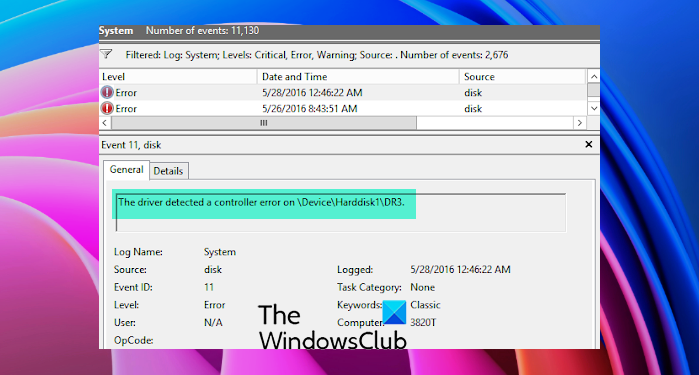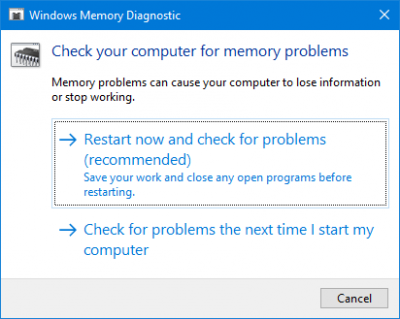Windows errors are every computer user’s nightmare. Some can be easy to resolve, while others were pretty difficult. One of the difficult to resolve errors is: The driver detected a controller error. It could be followed by the words on \Device\Ide\Ideport0 OR, on \device\harddisk0\dr0, \Device\Harddisk1\DR1 or DR3 or the name of the port or drive causing this issue. If you face this error, perhaps our suggestions will help you resolve it.
Fix The driver detected a controller error

You may see the following message/s in your event log:
- The driver detected a controller error on \Device\Ide\Ideport0
- The driver detected a controller error on \Device\Harddisk0\DR0.
- The driver detected a controller error on \Device\Harddisk1\DR1.
- The driver detected a controller error on \Device\Harddisk2\DR2.
- The driver detected a controller error on \Device\Harddisk3\DR3.
- The driver detected a controller error on \Device\Harddisk4\DR4.
You could proceed with the following solutions sequentially to resolve the problem:
- Check the drive for errors
- Disconnect and reconnect all hardware and cables
- Update drivers
- Update BIOS
- Run Hardware Diagnostics
- Get the motherboard replaced.
1] Check the drive for errors
Run Chkdsk and see if that helps.
To run Check Disk on your System Drive (C), using the command line, type the following and hit Enter:
chkdsk /f C:
If required, restart your computer.
this has been known to help many!
2] Disconnect and reconnect all hardware and cables
Many users have reported that the problem got fixed after they disconnected and reconnected the hardware cables. Perhaps, the cables being loose was the issue in their case.
Opening a computer’s cabinet usually requires expertise with hardware. It is for you to judge if it is worth attempting this solution.
3] Update drivers
One of the main causes of blue screen errors is outdated drivers. You could update the drivers using Devices Manager or Windows Update, or you could use a free driver updater software to do the same. Remember to create a system restore point first, though.one by one from the Device Manager, however, that is a cumbersome task.
Intel users may use Intel Driver Update Utility whereas AMD users may AMD Driver AutoDetect.
4] Update BIOS
Users have reported that updating the BIOS has helped them resolve the problem when everything else failed. Usually, the BIOS is available on your system manufacturer’s website. However, please confirm the make and model of the system before installing the BIOS.
5] Run Hardware Diagnostics (Windows Memory Diagnostics)

Windows Memory Diagnostics is a tool provided by Microsoft to check Windows systems for memory-related issues. The procedure to run the tool is as follows:
Press Win + R to open the Run window and type the command mdsched.exe in the window. Hit Enter to open the Windows Memory Diagnostics tool.
Select “Restart now and check for problems (recommended).”
6] Get the motherboard checked or replaced
If your computer is still under warranty, you might consider getting the computer’s motherboard replaced in case all of the above solutions failed.
Hope it helps!
Leave a Reply